Local
Kameny’s ashes remain in storage
Cemetery president proposes end to burial impasse
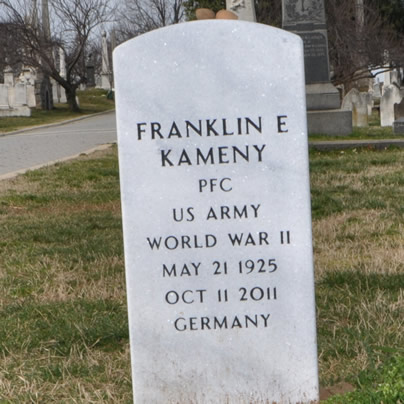
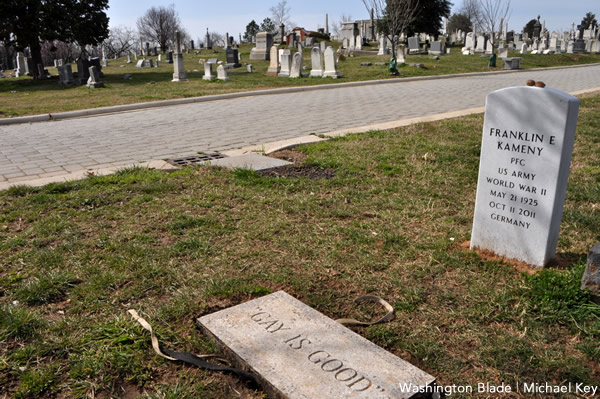
A headstone and a separate marker inscribed with Frank Kameny’s famous slogan ‘Gay is Good’ have been removed from his gravesite in Congressional Cemetery. (Blade photo by Michael Key)
Nearly 10 months after nationally acclaimed gay rights leader Frank Kameny died in his Washington home at the age of 86, an urn bearing his ashes continues to sit on a shelf in a storage vault in the headquarters building of D.C.’s historic Congressional Cemetery.
Cemetery officials said a dispute between Kameny’s estate and the D.C. gay charitable group Helping Our Brothers and Sisters (HOBS) over ownership rights to the plot where Kameny’s ashes were scheduled to be interred on March 2 forced the cancellation of the interment. HOBS purchased the plot earlier this year without consulting the estate, a development that the estate’s attorney says triggered the dispute.
The ashes, along with a headstone provided by the U.S. Veterans Administration recognizing Kameny’s military service during World War II and a separate marker inscribed with Kameny’s famous slogan “Gay is Good” have languished in storage at the cemetery since shortly after the interment was cancelled.
But in a surprise development on Wednesday, Congressional Cemetery’s new president, Paul Williams, disclosed in an email to the estate and HOBS that HOBS never had legal ownership rights to the Kameny plot because it failed to pay the balance on the purchase price.
“Because it had a balance, no deed was issued for the site to HOBS,” Williams said in his email.
“I propose we issue the deed directly to the estate (copy to HOBS) showing proof of ownership,” he wrote. “The estate would also need to sign an authorization of interment, which can be done at the same time. Then, we can replace the two stones in storage that we also have onsite and proceed with a private interment,” Williams wrote.
Glen Ackerman, an attorney representing the estate on behalf of Timothy Clark, whom Kameny named in his will as the main beneficiary of the estate, said the estate has accepted Williams’ proposal.
He said Williams’ disclosure that HOBS never had a deed to the cemetery plot and that the cemetery would issue the deed to the estate effectively ends the dispute by turning over the plot to Clark and the estate.
HOBS President Marvin Carter couldn’t immediately be reached Wednesday afternoon to comment on Williams’ disclosure that the cemetery planned to issue to the Kameny estate the deed to the cemetery plot.
Ackerman has said all along that the dispute centered on the estate’s desire to own the cemetery plot to ensure, among other things, that no one else would be buried or interred in the plot.
Under cemetery rules, two coffins and three urns may be buried or interred in Congressional Cemetery plots.
HOBS, which purchased the cemetery plot earlier this year from money donated by Kameny’s friends and admirers, has said it had no intention of burying others at the site.
Carter has said he and HOBS were always willing to transfer ownership of the plot to the estate. But people familiar with the dispute have said the point of contention was whether the estate should reimburse HOBS for the purchase price of the plot.
Ackerman has said Clark’s position was that donors from the LGBT community put up the money to buy the plot by giving it to HOBS, a non-profit group with tax-exempt status, so the donors could receive a tax deduction on their contribution. HOBS, in turn, made the purchase on behalf of the donors, the estate has maintained.
Meanwhile, the cemetery’s former interim director, Patrick Crowley, said he had the headstone and marker removed from the gravesite earlier this year until the estate and HOBS reached an agreement over final ownership of the plot.
Ackerman has said Clark and the estate became alarmed in February when a small group of Kameny friends announced in a press release that an interment ceremony for Kameny’s ashes would take place at the cemetery on March 3. Ackerman said organizers of the interment never consulted Clark or the estate, even though the estate had legal rights to the ashes.
Organizers of the interment ceremony abruptly cancelled the ceremony and burial the day before it was scheduled to take place on March 3, saying they did so out of “respect” for the Kameny estate. The urn bearing Kameny’s ashes has been in storage in the cemetery’s offices at 1801 E St., S.E. ever since that time.
The burial ceremony organizers, led by gay rights advocates and longtime Kameny friends Charles Francis and Bob Witeck, have said through intermediaries at the time that they invited Clark to participate in the ceremony and attempted to keep him informed of their plans. They said Ackerman refused to allow them to speak directly to Clark.
Gay activist and longtime Kameny friend Rick Rosendall, who was scheduled to speak at the Kameny interment ceremony, said it was his understanding that it was the estate’s “demand that no interment could be held until the deed to the burial plot was turned over to the estate that led to the event’s cancellation.”
Rosendall said he expressed his hope at the time that the dispute could be resolved. “That is still my hope,” he said.
Ackerman said the estate didn’t learn of the burial service until it obtained a copy of the organizers’ Feb. 13 press release announcing the ceremony.
He said the Kameny friends’ decision to organize the burial without initially consulting Clark or the estate created an atmosphere of mistrust between the two parties. Because of that, he said, Clark has insisted that ownership of the cemetery plot be transferred from HOBS to the estate without charge before the estate would consent to allowing the ashes to be buried.
Clark told the Blade in an interview earlier this year that he planned to keep half of the ashes and would donate the remaining half to be interred at Congressional Cemetery.
Francis and Witeck took initial possession of the ashes following Kameny’s death after Kameny’s sister, Edna Kameny, Kameny’s surviving next of kin, signed over power of attorney for Kameny’s remains to Witeck. Edna Kameny, who lives in New York and is in frail health, told the Blade she was pleased to entrust to Witeck and other Kameny friends the task of carrying out her brother’s stated wish to be cremated and to make funeral and memorial arrangements.
Once the details of Kameny’s will became known, including Clark’s role as personal representative or executor of the estate, Ackerman said it became clear that Clark and the estate should take possession of the ashes.
But when Clark sought to obtain possession of the ashes he said Francis told him the ashes had already been buried, a development that contributed to the mistrust between the estate and the Kameny friends organizing the burial.
Ackerman said it wasn’t until the estate saw the Feb. 13 press release announcing the interment ceremony at Congressional Cemetery that he and Clark learned the ashes had not, in fact, been buried.
When contacted on Wednesday, Francis said he had no comment on the matter, saying the dispute over the ashes is between the estate and HOBS and he has nothing to do with it.
Last week, Congressional Cemetery President Williams said he was hopeful that the dispute between the two parties would be resolved soon but said he couldn’t predict when that would happen.
“We have a little movement,” he told the Blade on July 27, saying negotiations were taking place between the estate and HOBS.
“It’s all confidential so far until everything’s signed. But I can tell you that the two parties have come to an agreement, that being the estate and Helping Our Brothers and Sisters.”
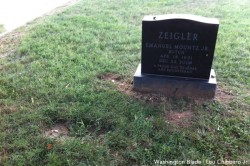
Before being removed earlier this year from this gravesite, the head and foot stones for Frank Kameny were located to the left and in front of head stone shown here, which marks the grave of another person. (Blade photo by Lou Chibbaro Jr.)
However, when reached two days later by phone, Carter told the Blade Williams had just informed him he had a proposal to resolve the dispute but that Williams did not provide any details about the proposal. Carter said Williams told him he would take steps to provide those details soon.
“HOBS has always been willing to work things out,” Carter said. “We’re not interested in continuing to own the gravesite.”
Carter told the Blade in a phone interview on July 29 that he had been out of town for the past few weeks and didn’t have a chance to check mail that may have been sent to HOBS.
“But no one from the estate has called me or emailed me about this recently,” he said. “They have my number and email address.”
Ackerman disputes this assertion, saying he and his law firm repeatedly sent written material to Carter by certified mail. He said the mail was returned to the law firm marked “refused” by recipient.
Virginia
Defying trends, new LGBTQ center opens in rural Winchester, Va.
‘It has taught me that I am not alone in this place’
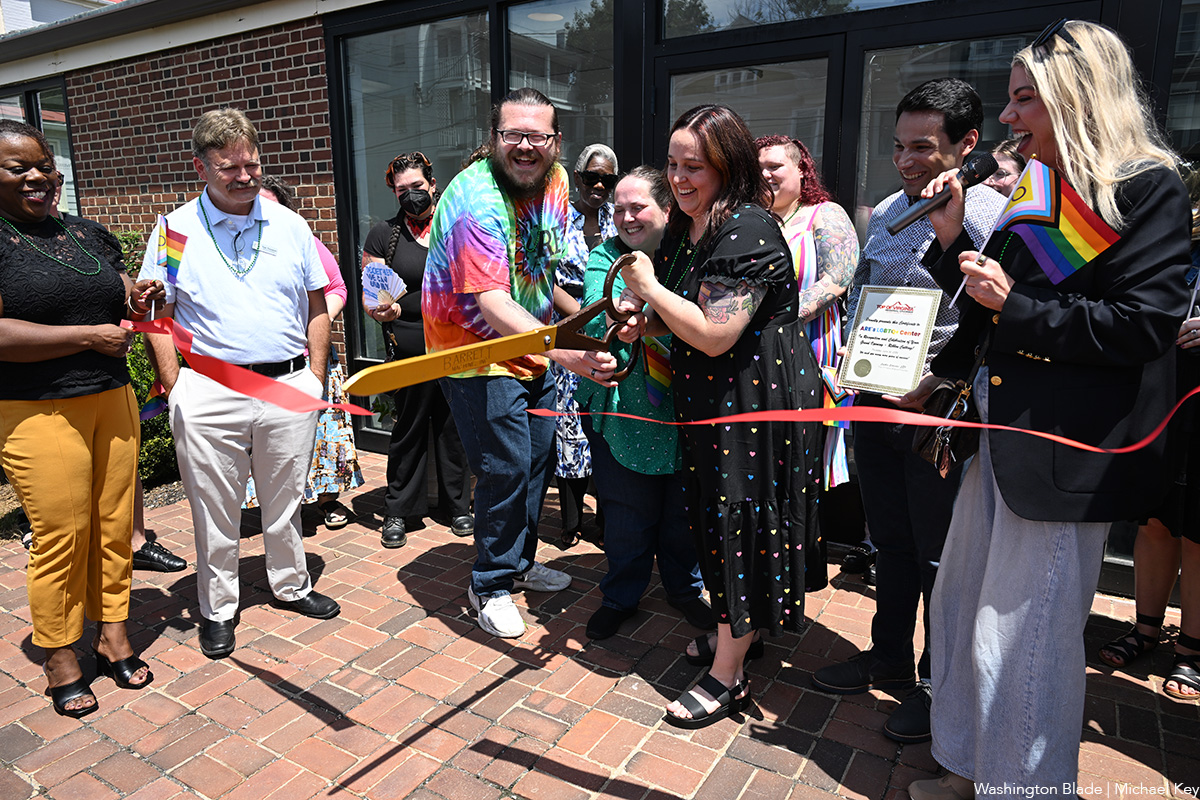
A new LGBTQ community center celebrated its grand opening on June 30 in Winchester, Va., defying recent trends amid a federal crackdown on DEI and LGBTQ funding.
The local HIV/AIDS service organization AIDS Response Effort, Inc. (ARE) worked with a team of volunteers to open the area’s first physical center.
ARE’s R.I.S.E. (Resources, Inclusion, Support and Empowerment) Center, located near the heart of Old Town Winchester on West Piccadilly Street, is more than a renovated bank building to the local LGBTQ community. The empty teller window on the side of the structure and converted vault inside give away the building’s past. But the volunteers, program participants, and well-wishers gathered at the ribbon-cutting ceremony tell the Blade that they are hopeful for a thriving future for the building — and the community.
The Washington Blade spoke with the executive director of ARE as well as the co-directors of ARE’s R.I.S.E. Center during a tour of the facility ahead of the opening.
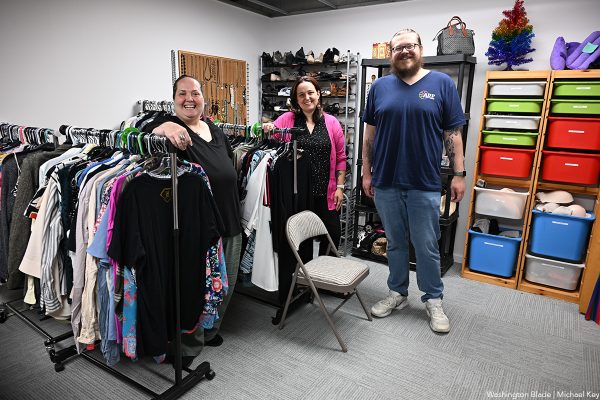
Katy Vance, executive director of ARE told the Blade, “I started [at ARE] about five years ago and we were an AIDS service organization, we have been for about 35 years now. We started as a group of volunteers out at the hospital —with Valley Health, and we’ve grown into a program that provides HIV case management for folks living with HIV in the community.”
Vance explained that as community needs have changed for service organizations like ARE, it has led to some soul-searching among advocates.
“We had this big meeting about, ‘who are we?,’ ‘who do we want to be?,’ ‘who do we want to be in a few years?,’” Vance recalls. “As things shift and change with HIV … we have a lot of folks that come into our office who are newly diagnosed. They will get connected to a medical case manager, they’ll get on medication, and they are undetectable within one to two months, which means they are untransmittable, which is amazing.”
“So, science and technology has come so far,” Vance continued. “And so, who are we when this tends to go in the direction of no longer being the major epidemic it has been for the last 30 years, right?”
“But, when I came in, we also had a general housing program for anyone in the community,” Vance said. “That was confusing for a lot of people who came into our doors trying to figure out who we were and what we are. We called it, our ‘identity crisis,’ essentially.”
“Are we an HIV service organization? Are we a housing program?” Vance asked. “So we worked with our local Goodwill and the board got together and we decided to transition our housing program out and we realized we wanted to open an LGBTQ center.”
“We have had a little bit of pushback as to why an HIV agency is opening a center,” ARE’s R.I.S.E. Center Co-Director Matt Buracker said. “Obviously, HIV and LGBT identities have a long history and a lot of stigma, but we felt like it was kind of irresponsible to talk about one without talking about the other. And we’ve always been supporting the LGBT community, so we’re just expanding our services to encompass more.”
The center seeks to serve the LGBTQ community in a county that Donald Trump carried with more than 63% of the vote in the 2024 election. While ARE receives local, state and federal grants for its operations, the LGBTQ center is currently funded by community donations and a founders’ campaign and is staffed with volunteers.
Vance tells the Blade that the Center met its initial fundraising goal of $50,000 very quickly. The building housing the center was renovated with a combination of grants, donations and volunteer work.

“I think our fundraising goals now are going to be more programmatic so that we can do the things that we want to do,” R.I.S.E. Center Co-Director Mary Bohacek said. “Because Matt and I are great at finding things to do for free. But there are other things that people are asking us to do, craft events or things that aren’t free to do. Eventually, we might need a license if we want to do movie screenings. So there is always going to be a fundraising need to fund the programming, but the building has been a huge success.”
“The support from the community has been overwhelming,” Buracker told the Blade. “We’ve had such a positive response from the community and it’s just it’s been so emotional to see that the need has been here and we are the one to finally do something about it.”
Vance interjected, “And of course, there are community members that aren’t a fan that are ‘keyboard warriors’ that are coming out saying stuff. What is amazing is: we had an article in the paper and they put it up on their Facebook page and people were making just terrible comments. But then, we got new volunteers from that. The community support has been, like Matt said, amazing and overwhelming.”
ARE’s R.I.S.E. Center is a member of CenterLink, a community of LGBTQ centers. Other LGBTQ community centers in the wider region include the Roanoke Diversity Center in Roanoke, Va, the Shenandoah LGBTQ Center in Staunton, Va., Diversity Richmond in Richmond, Va., NOVA Prism Center in McLean, Va., the DC Center for the LGBT Community in Washington, D.C. and the Frederick Center in Frederick, Md. A new MoCo Pride Center is scheduled to open in Bethesda, Md. in August.
While the physical building opened to the public on June 30, the R.I.S.E. Center in Winchester has held events for more than a year.
“We’ve had programming going on for almost two years now,” Bohacek told the Blade. “Our first event was a ‘Friendsgiving.’ There were so many people that showed up that we literally didn’t have enough space: we needed to knock down walls.”
The staff and volunteers at ARE and the nascent Center used that momentum to foster the growth of affinity groups, community groups and services.
Affinity groups are described as “not just support groups or social groups, but rather as something of a hybrid between the two.” As Bohacek says about the affinity groups, “if someone needs community or needs a place to talk about queer issues, they have a space to do that.”
Affinity groups hosted by the Center include a group for trans and gender non-conforming people, a group for the families of trans people, a polyamorous affinity group, an aro-ace group, a “Rainbow Connection” all-purpose group, and a “Gay-RP” affinity group for people 50 and older.
“We also have a young adult group, which is for ages 18-25, which is one of the more vulnerable sections of our community,” Bohacek said. “So we want to make sure that they have places to connect.”
As reported in the Blade, the youth advocacy organizations Hopelab and Born this Way Foundation recently issued a report that suggests LGBTQ youth (ages 15 to 24) living in rural communities face greater challenges than their suburban or urban peers in dealing with their sexual orientation or gender identity, though have significantly benefited from online resources.
“We also have some community-wide programming that allies are welcome attend,” Bohecek said. Programming includes a monthly game night, a volunteer night for the many Center volunteers, as well as the “stitch and bitch” group, who “sit, crochet, embroider and talk.”
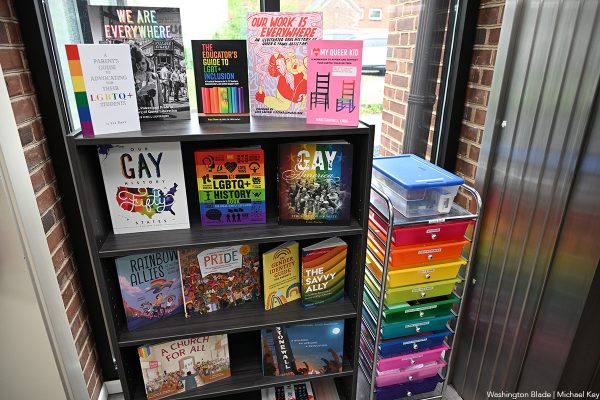
“And Coffee and Coloring!” Bohecek exclaims. “That’s one of my favorites. We like to say it’s about — just sit down, relax, have a cup of coffee — but frankly it’s about community building.”
Bohacek proudly lists the many other services the center offers, including a transgender/gender-affirming closet, which is currently overflowing with donations of clothes.
“We also have an amazing library of all kinds of identities and all kinds of ages for people to come and see,” Bohacek told the Blade. “This building is actually an old bank, so we put our books into the vault.”
The old bank, now vibrant community center, was filled to capacity for the official opening ceremony on a hot Monday afternoon in late June. People from across the Shenandoah Valley who had come to the ribbon-cutting event snacked on rainbow-colored cupcakes as they toured the renovated building.
“To be a gay man growing up in a small, rural area . . . we didn’t have anything like this,” Front Royal, Va. resident Ed McKee told the Blade. Though he lives in a town a few miles away, he works at a salon in Winchester and had come to see the new center opening.
“We didn’t have anything like this when I was growing up,” McKee said as he gestured toward the packed LGBTQ community center. “If we had, it would have made my life so much easier. I probably would have come out sooner — I didn’t come out until I was about 30 — because I would have felt the support, you know?”
“Especially now with everything that is going on in our country,” McKee continued. “We need to show strength in numbers: come together. And the center is allowing for that to happen.”
McKee’s husband, Winchester business owner Paul Miller, agreed.
“I’m hoping that [the Center] can be a great way to connect with people who might not otherwise understand how they can come together,” Miller told the Blade. “And I’m hoping that, while I’m not sure that this is its mission, I’m hoping that it has a political effect in Virginia.”
Members of the community who came to witness the opening gathered outside of ARE’s R.I.S.E. center for the ribbon cutting. Speakers at the ceremony included the Center’s co-director Bohacek.
“Today, we’re celebrating the renovation of the building,” Bohacek began. “But, we’re also celebrating the rise of this community.”
“This community has taught me resilience and it has taught me friendship and it has taught me that I am not alone in this place,” Bohacek told the crowd. “There are people that care. And we are so proud to have a place where we can be ourselves, where anyone and everyone is welcome — and we mean it. So, with that said, let’s keep on rising!”
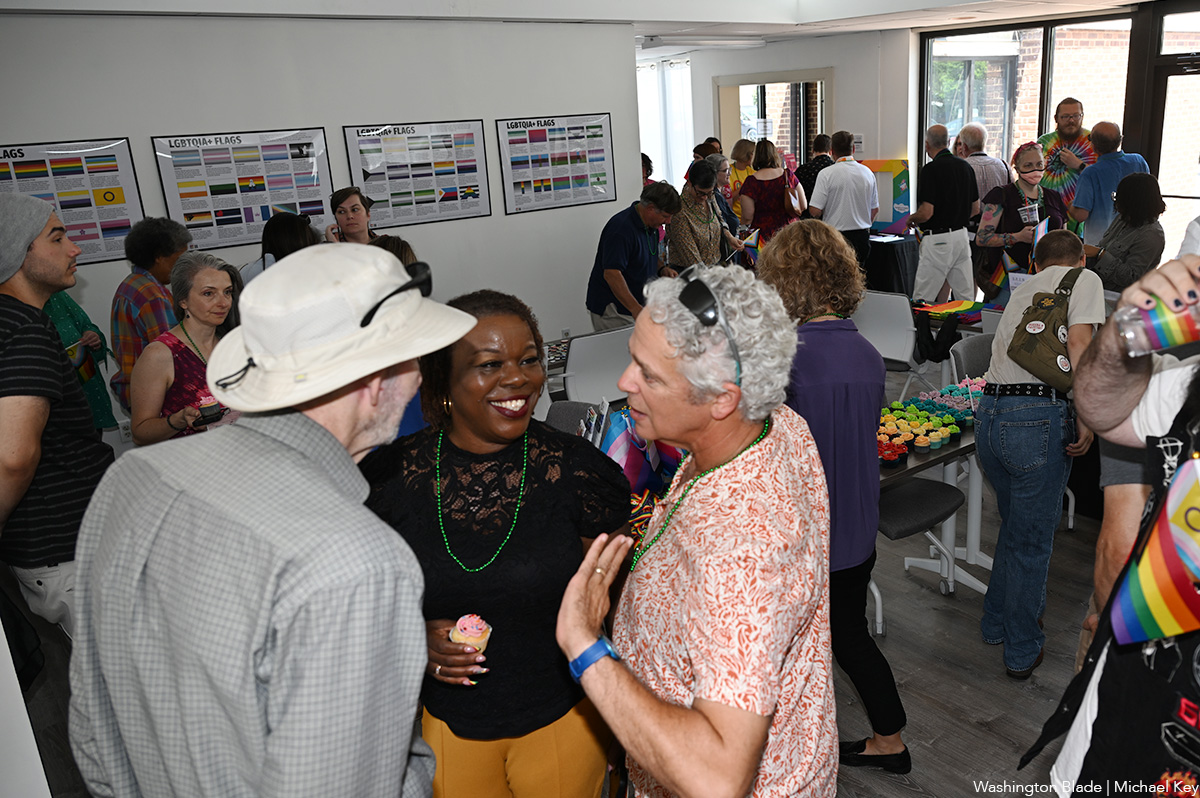
Maryland
Maryland’s oldest rural gay bar — and one of the last — is a log cabin in the woods
The Lodge is a Boonsboro watering hole resembling a log cabin

By SAPNA BANSIL | In the woods of a conservative Western Maryland town of fewer than 4,000 people is an unlikely landmark of state LGBTQ history.
The Lodge, a Boonsboro watering hole that resembles a log cabin, is Maryland’s oldest rural gay bar — one of a few remaining in the country, according to historians.
For about four decades, the Washington County venue has offered safety, escape and community to queer people far from large, liberal cities. Starting Friday night, The Lodge will close out Pride month with one of its biggest parties of the year: a weekend of dancing, drinking and drag in celebration of Frederick Pride, held about 20 miles away in the area’s largest city.
The rest of this article the Baltimore Banner published on June 27 can be read on its website.
Virginia
Va. court allows conversion therapy despite law banning it
Judge in June 30 ruling cited religious freedom.

In 2020, the state of Virginia had banned the practice of conversion therapy, but on Monday, a county judge ruled the ban violates the Virginia Constitution and Religious Freedom Restoration Act, allowing the therapy to start once more.
The conversion therapy ban, which can be seen in Va. Code § 54.1-2409.5 and 18VAC115-20-130.14, was overturned on June 30 as a result of two Christian counselors who argued that their — and all Virginia parents’ — constitutional right to freedom of religion had been encroached upon when the state legislature passed the ban.
A Henrico County Circuit Court judge sided with John and Janet Raymond, two Christian counselors represented by the Founding Freedoms Law Center, a conservative organization founded in 2020 following Virginia’s conversion therapy ban. Virginia’s Office of the Attorney General entered a consent decree with FFLC, saying state officials will not discipline counselors who engage in talk conversion therapy.
Conversion therapy, as the legislation described it, is considered to be “any practice or treatment that seeks to change an individual’s sexual orientation or gender identity, including efforts to change behaviors or gender expressions or to eliminate or reduce sexual or romantic attractions or feelings toward individuals of the same gender.” The ban’s reversal will now allow parents to subject their children to these practices to make them align better with their religion.
This decision comes despite advice and concern from many medical and pediatric organizations — including the American Psychiatric Association, American Psychological Association, American Association for Marriage and Family Therapy, and the American Counseling Association, to name a few — all of which denounce conversion therapy as dangerous and harmful to those subjected to it.
The American Medical Association, the largest and only national association that convenes more than 190 state and specialty medical societies, says that “these techniques are the assumption that any non-heterosexual, non-cisgender identities are mental disorders, and that sexual orientation and gender identity can and should be changed. This assumption is not based on medical and scientific evidence,” with attached data indicating people subjected to conversion therapy are more likely to develop “significant long-term harm” as a result of the therapy.
The AMA goes as far as to say that they outright “oppose the use of reparative or conversion therapy for sexual orientation or gender identity.”
FFLC has a clear goal of promoting — if not requiring — conservative ideology under the guise of religious freedom in the Virginia General Assembly. On their website, the FFLC argues that some progressive policies passed by the Assembly, like that of freedom from conversion therapy, are a violation of some Virginians’ “God-given foundational freedoms.”
The FFLC has argued that when conservative notions are not abided by in state law — especially when it involves “God’s design for male and female, the nuclear family, and parental rights” — that the law violates Virginians’ religious freedom.
A statement on the FFLC’s website calls gender dysphoria among children a “contagion” and upholds “faith-based insights” from counselors as equal — in the eyes of the law — to those who use medical-based insights. This, once again, is despite overwhelming medical evidence that indicates conversion therapy is harmful.
One study showed that 77 percent of those who received “sexual orientation change efforts,” or conversion therapy, experienced “significant harm.” This harm includes depression, anxiety, lowered self-esteem, and internalized homophobia. In addition, the study found that young LGBTQ adults with high levels of parental or caregiver rejection are “8.4 times more likely to report having attempted suicide,” with another study finding that “nearly 30 percent of individuals who underwent SOCE reported suicidal attempts.”
Virginia Senate Majority Leader Scott Surovell, a Democrat representing Fairfax, said that the overturning of the ban on religious merit disregards the entire concept of having professionally licensed counselors.
“I have no problem if somebody wants to go look at religious counseling from their priest or their minister, their rabbi, their imam — that’s perfectly fine,” Surovell told the Virginia Mercury. “When somebody goes to get therapy from somebody licensed by the commonwealth of Virginia, there’s a different set of rules applied. You can’t just say whatever you want because you have a license. That’s why we have professional standards, that’s why we have statutes.”
-

 Sports5 days ago
Sports5 days agoTrans cyclist’s victory sparks outrage in conservative media
-

 Congress5 days ago
Congress5 days agoCongress passes ‘Big, Beautiful Bill’ with massive cuts to health insurance coverage
-

 Israel5 days ago
Israel5 days agoActivist recalls experience in Tel Aviv after Israel-Iran war began
-

 Celebrity News5 days ago
Celebrity News5 days agoNina West’s ‘Sugar in the Tank’ tour comes to Rehoboth Beach












